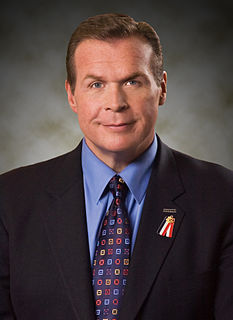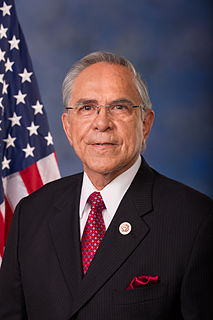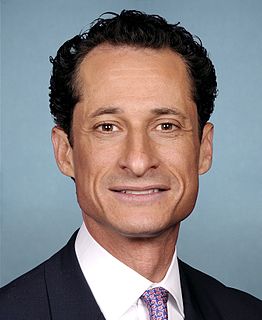A Quote by Lindsey Graham
If you increase taxes now on - at any level, it's going to make it harder to create jobs And we've lost 2 1/2 million jobs since the stimulus package passed. We're at 9.6 unemployment. So I don't think we tax too little, I think we spend too much.
Related Quotes
I think jobs can have a big impact. I think if we continue to create jobs - over a million, substantially more than a million. And you see just the other day, the car companies coming in with Foxconn. I think if we continue to create jobs at levels that I'm creating jobs, I think that's going to have a tremendous impact - positive impact on race relations.
The United States of American business pays the second-highest business taxes in the world, 35 percent. Ireland pays 11 percent. Now, if you're a business person, and you can locate any place in the world, then, obviously, if you go to the country where it's 11 percent tax versus 35 percent, you're going to be able to create jobs, increase your business, make more investment, et cetera. I want to cut that business tax. I want to cut it so that businesses will remain in the United States of America and create jobs.
Since the government creates no wealth, it can only transfer the wealth required to hire people. Even if the government creates a million jobs, that is not a net increase in jobs, when the money that pays for those jobs is taken from the private sector, which loses that much ability to create private jobs.
Look at what's happening between Main Street and Wall Street. The stock market index is up 136 percent from the bottom. Middle class jobs lost during the correction: six million. Middle class jobs recovered: one million. So therefore we're up 16 percent on the jobs that were lost. These are only born-again jobs. We don't really have any new jobs, and there's a massive speculative frenzy going on in Wall Street that is disconnected from the real economy.
The poverty we see in America is now too widespread, and too complex, for easy fixes. But I do think we can reimagine many of our institutions and can create new ones in ways that would be effective. We could, for example, create social insurance systems, similar to social security, such as that we went through in 2008-9. We could create a financial transaction tax, oil profit taxes and a fairer estate tax system, and we could plow much of the revenue raised from these into job training programs, into better education infrastructure, into an expanded Earned Income Tax Credit.
According to, for example, one academic by the name of Philip Harvey, whose expertise is basically how do we create a New Deal, today. According to his estimate, these jobs could be created for far less than the [Barack] Obama stimulus package, which cost, you know, $700 or $800 billion, something like that, and produced around 3 million jobs - not a lot. According to his estimates, it would cost less to produce two-thirds of 20 million.
I think that Democrats have to think through answers we haven't in the past: How we are going to create those jobs? How should we restructure the entire tax code? Should we have things like a payroll tax, when jobs are so scarce? They weren't - basically the architecture of our employment law, tax law, all these things were from the 1930s - and I do think that one benefit of Donald Trump, which is not worth it, but one perverse thing is, he has widened the scope of things that we should discuss.
There is too much economic growth not happening that needs to be jump-started. There are too many jobs to be created, and there's too much wealth waiting to be created. If that got going, there'd be no stopping Trump; I don't care what the Democrats think they've got on any of this collusion with the Russians 'cause there's nothing there.
Taxes are paid in the sweat of every man who labors. If those taxes are excessive, they are reflected in idle factories, in tax-sold farms, and in hordes of hungry people, tramping the streets and seeking jobs in vain. Our workers may never see a tax bill, but they pay. They pay in deductions from wages, in increased cost of what they buy, or - as now - in broad unemployment throughout the land.
All those predictions about how much economic growth will be created by this, all of those new jobs, would be created by the things we wanted - the extension of unemployment insurance and middle class tax cuts. An estate tax for millionaires adds exactly zero jobs. A tax cut for billionaires - virtually none.






























